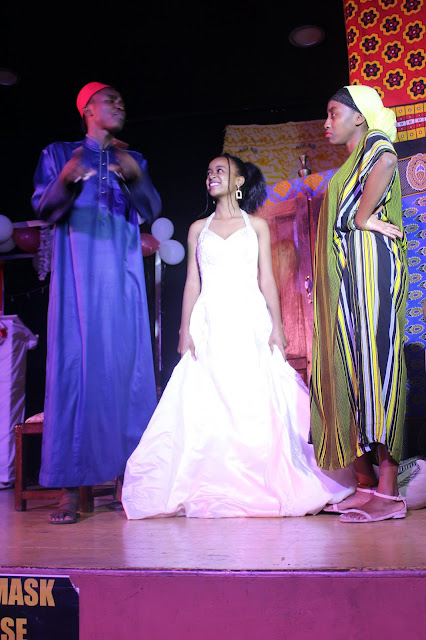INTER-ETHNIC WEDLOCK A TABOO OR NEW HOPE?
By
Margaretta wa Gacheru (posted August 20th, 2021)
Peter Tosh
has a taste for tackling troubling social issues in his plays, like the topic
that doesn’t go away, namely ethnicity or tribalism.
His latest
tale treats tribalism like a superbug that gets handed down from one generation
to the next.
Technically,
Kenyans are supposed to be over ethnicity. Or at least the younger generation
are. Yet will the elders allow the youth to violate tradition and culture, or
not?
These are
the issues theatrically raised by Liquid Art’s latest production, entitled
‘Katiba’ which premiered last weekend at Kenya Cultural Centre.
Brill
(Stephen Mwangi) and Vanessa (Nora Adisa) are intent on getting married and
their wedding is just two days away. But there are heavy-duty family forces that
are dead-set against it .
Vanessa also
has her own ferocious naysayer in her mother, Rukia (Vivian Nyawira), who has
similar ethnic arguments to Tim’s. They are reinforced once her father (Peter
Tosh) arrives. He too is deeply committed to his culture and time-honored
traditions. But he also blames Rukia for ‘underfeeding’ Vanessa who is skinny
‘like a mosquito’, a term similarly used as an insult by Tim.
What is clear is that Tosh is trying to show us that these ethnic stereotypes, especially those opposing cross-cultural marriage, are deep-seated beliefs. ‘Katiba’, the play’s title, is actually a metaphor for a new type of ‘c
onstitution’ being sought by the youth. In an interview that Weekender
had with Tosh last Sunday, he explained his metaphor.
“Just as we
fought for a new constitution, but the one we got turned out to be no better
than the old one, so the new notion of relationships [based on monogamy and
romantic love] may seem to be a new and better way of constituting marriage.
But really, is it any better than what couples had before?”
That is when
Uncle Tim bursts into Vanessa’s house (how did he know where it was?) and viciously
attacks the girl. His taunts are not only abusive to the bride to be. They are
literally terrorizing and scary.
But thereafter,
what comes out in an exchange between Brill’s Pastor Ben (Majestic Steve) and
Uncle Tim is that Tim had once loved Rukia desperately, and she had felt the
same way toward him. But at one critical moment, they had a misunderstanding
that each took to be intentional. They had planned a late-night rendezvous. But
both got lost and didn’t meet. Each took the event personally and they never
saw each other again. The bitterness of that ‘betrayal’ is what has fueled both
Tim’s and Rukia’s opposition to their offspring’s wedding. They had once been
brave enough themselves to cross tribal lines to fall in love. But it hadn’t
worked for them, so they fell back into familiar tribal territory rather than to
reconcile and be friends again.
The finale
scene is the wedding which looks hopeful since Rukia arrives with her girl,
head covered in kangas as is a custom in some cultures. But when the cloths are
lifted, and after Brill has gleefully sung “Just the two of us”, it’s revealed
that the bride is not Vanessa, but Uncle Tim’s choice, Salma (Mary Muthee). At
that discovery, Brill faints and that is The End.
What I found
most interesting is that the house-full audience, like myself, had no intention
of applauding then. We were waiting for what we anticipated to be the final
scene, when Brill would go for Vanessa and their ‘new katiba’ would begin, when
as Brill explained, they would be making their own rules. But that last scene
never came. So the ending is inconclusive, but disappointing all the same.
Just as Tosh said, as long as elders oppose inter-ethnic wedlock, and until there’s a radical change in perspective, mixed marriage may continue to be a taboo.




No comments:
Post a Comment